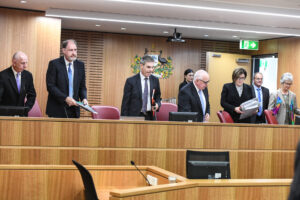Webinar on Wages, Prices, and Power
The Australian Council of Trade Unions is sponsoring a series of webinars for union members, delegates, officials, and leaders on the current crisis in the cost of living in Australia. The surge in inflation since economic re-opening after COVID lockdowns has obviously intensified that crisis. But the seeds for it were planted long ago: by a decade of historically weak wage growth, a speculative property price bubble, and a systematic efforts to weaken collective bargaining and unionisation.
Jim Stanford (Economist and Director) and Greg Jericho (Policy Director, Labour Market and Fiscal) from the Centre for Future Work are providing keynote presentations as part of this series. Below is a recording of the first of these presentations, presented by Jim.
For other resources on inflation, how it is undermining real living standards for workers, and how to fix it (without throwing the whole economy into recession – an even bigger risk!), please see:
The Wages Crisis: Revisited (Centre for Future Work overview of falling real wages, by Andrew Stewart, Jim Stanford, and Tess Hardy)
An Economy That Works for People (ACTU Macroeconomics Discussion Paper)
“The Cure of Inflation Looks Worse than the Disease“ (latest Guardian Australia column by Greg Jericho)
Related research
You might also like
The continuing irrelevance of minimum wages to future inflation
Minimum and award wages should grow by 5 to 9 per cent this year
A smooth move or a tough transition? Protecting workers who’ll lose their jobs when the Eraring Power Station closes
The Centre for Future Work at The Australia Institute has urged the federal government to take charge of transitioning hundreds of workers into secure employment when the Eraring Power Station shuts down.
Dutton’s nuclear push will cost renewable jobs
Dutton’s nuclear push will cost renewable jobs As Australia’s federal election campaign has finally begun, opposition leader Peter Dutton’s proposal to spend hundreds of billions in public money to build seven nuclear power plants across the country has been carefully scrutinized. The technological unfeasibility, staggering cost, and scant detail of the Coalition’s nuclear proposal have


